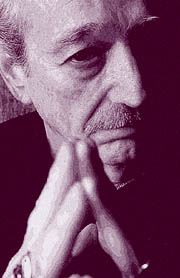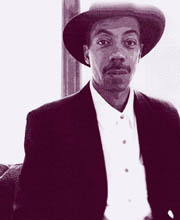|
COVER
STORY | IN THE NEWS | GARDEN | PUBLISHER July 8, 2004
by BOB DORAN
It's that time again. On Saturday and Sunday, July 10 and 11, Halvorsen Park, the green down along Eureka's waterfront, fills with people -- and the blues is in the air. Of course there's more than blues. In fact, Blues by the Bay Vol. VIII has the most eclectic lineup to date. Everything from the New Orleans funk of Saturday headliners the Funky Meters to hard-driving R&B by perennial favorite Tommy Castro, this year making "Triple Trouble" with guests Jimmy Hall from Wet Willie on harp and sax and Oregonian Lloyd Jones adding a second guitar. Alvin Youngblood Hart and Muscle Theory provide rootsy blues; Laura Love and Barbara Lamb bring in funk folk (or is it folky funk?). You've got your New Orleans style blues from Walter "Wolfman" Washington, soul from former local Earl Thomas, and still more blues: Delta-style from Eurekan Don Haupt and R&B from ShinBone a new local trio with Geoff Daugherty on standup bass, Robert Franklin on electric guitar and dobro, and KHSU blues deejay Charles Horn on harmonica. Two of the bluesmen, harmonica king Charlie Musselwhite and Afro-blues-jazzman Olu Dara, hail from that home of the blues, Mississippi. The Journal spoke with them last week.
a comforter in hard timesHarmonica master Charlie Musselwhite [photo below] has lived in California for years, but he's considered a Chicago bluesman -- yet in Chicago he was known as Memphis Charlie, despite the fact that he was born in Kosciusko, Miss. When I caught up with him at his home outside of Healdsburg, we began with talk of a recent acquisition, the Delta Wholesale Building in Clarksdale, Miss. "It's a 50,000-square-foot building from the 1800s, I'm told. I bought it. I don't know exactly what I'm going to do with it, but I'll do something. I'm thinking about maybe making it into a hotel. I'm planning on having another home there. It'll be where I'll go to relax."
At 60 years of age, Musselwhite has covered a lot of territory, seen good times and bad, and along the way recorded 30 albums. His latest, released on Peter Gabriel's Real World label, is titled Sanctuary. "It's a dark album," said Musselwhite. "That's because we're in dark times in the world, and in America. And in the same way that the blues is like a comforter in hard times, I'd like to think that someone listening to the album will find a place to rest in these difficult times. "I say it's dark, but it's not a depressing album -- there is humor, and in the spirit of blues, it's always about keepin' on keepin' on. You never give in. You recognize the tough times and recognize that we can get through them. That's what the blues help us do. "The blues are about everything life has to offer. They're with you through the good times with jumpin' blues and good time blues, and when things are rough it's there for you, too. But it's always about getting through, never about giving up. "In country music, a guy might sing, `My baby left me, I'm going to jump off the bridge.' In blues, you sing, `My baby left me, I'm just gonna find myself a new baby.' It might be dark outside, but you gotta hang in `til the sun comes up." Musselwhite is bringing a combo including hotshot guitarist Rusty Zinn to Blues by the Bay. His band will also back guitarist Duke Robillard, who played at the local blues fest in 2002. "I've played plenty of gigs where Duke backed me up; now it's my turn to back him up," said Musselwhite with a laugh. "We're going to have a good time. We'll have fun and that means the audience has fun, too. Bring your dancing shoes; come early and stay late. We'll all have a ball."
it just feels rightToday he lives in New York City, Harlem to be exact, but Olu Dara [photo below] is originally from Natchez, Miss. "It was a small town, about 15,000 people," said Dara, explaining that both his parents worked teaching school in Natchez. His father also sang in an R&B quartet with a cousin and instilled a love of music in his kids. "Our whole family for generations were musicians, visual artists and like that, on both sides," he added, explaining that he started out playing cornet in school. "Then I played it in college and in the Navy. That's where I got into jazz, in the Navy. We played big band style, in small combos, all kinds of music." When he left the Navy in 1964,
he had no particular plan. "I got stranded in New York when
I was discharged. I had no money to leave here, and since I was
young, it didn't seem to matter where I wound up." He found a variety of work, then at the age of 30, decided to try music again. "My first job was playing with one of the original fatback bands; we were called Pretty Willie and the Soul Brothers. I was playing in rhythm and blues groups and I never thought I'd be a jazz player -- I didn't grow up in that environment -- but the opportunity arose, and once I got into it, it came naturally, and I found myself playing with some of the greatest jazz players, including Art Blakey." While he was playing sessions for a number of bands in the New York avant garde jazz scene, another opportunity arose, and he took off on the road with the musical Hair. That proved to be the beginning of a life in the theater, including work with the award-winning playwright August Wilson. "I was mostly a composer and musical director, sometimes I would act in plays, too. And I wrote plays for years. The first one was a radio play called From Natchez to New York; I also named my first album from that." At this point in our conversation, Dara was interrupted by a cell phone call from his son, the incredibly successful hip hop artist Nas. "He's trying to get me to go down south and do a record with him. We've recorded together several times before," Dara reported. In fact it was his son who encouraged him to record some of the music he had created for theater for his first album. When he went into the studio, all he had to do was "take vignettes I'd written, snips of songs I'd written for the theater, and made them into songs for my band. It was as simple as that." The result was a unique amalgam: sketches and stories set to a mix of blues, jazz and African music. "It's basically storytelling," said Dara. Some of the members of his band had been working with him in the theater for 20 years. Two are African: guitarist Kwatei Quartey is from Ghana; percussionist Coster Massamba is from the Congo. Dara says he feels particularly "comfortable" playing with African musicians. "It's the way the music sounded when I was in Mississippi growing up, like the rhythms played by the blues bands." He lights up at the suggestion that his sound draws a lot from an era even before recorded blues. "I'll tell you why you get that feeling. My grandmother, Rosie Jones, she was born in the 1800s, and she was always singing and doing rhythmic things when I was a little kid. I always tell people my influences come from before radio, TV and the telephone -- through her. "Growing up in Mississippi in the '40s and '50s it was like being back 100 years before that -- the environment, the way we lived, everything. I didn't experience electricity and lights until I was the age of 12. We were in another world, and I enjoyed it. I think when I sing, sometime I sound just like my grandmother, especially when it's just me and the guitar, and it just feels right."
Bob Doran COVER
STORY | IN THE NEWS | GARDEN | PUBLISHER Comments? © Copyright 2003, North Coast Journal, Inc. |


 It
will be a return home for Musselwhite. His mother grew up on
a plantation just outside of town. "In fact, she grew up
on the Sessions Plantation, right next to the Stovall Plantation,
that's where Muddy (Waters') cabin was."
It
will be a return home for Musselwhite. His mother grew up on
a plantation just outside of town. "In fact, she grew up
on the Sessions Plantation, right next to the Stovall Plantation,
that's where Muddy (Waters') cabin was."